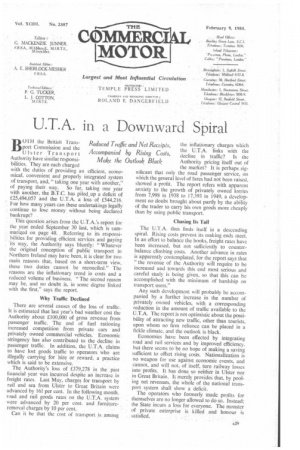U.T.A. in a Downward Spiral
Page 31

If you've noticed an error in this article please click here to report it so we can fix it.
BOTH the British Transport Commission and the Ulster Transport Authority have similar responsibilities. They are each charged with the duties of providing an efficient, economical, convenient and properly integrated system of transport, and, "taking one year with another," of paying their . way. So far, taking one year with another, the. B.T.C. has pileup a deficit of £25,494,057 and the U.T.A. a loss of £544,216. ' For how many years can these undertakings legally continue to lose money without being declared bankrupt? . . This question arises from the U.T.A.'s report for the year ended September 30 last, which is suminari4ed on page 48. Referring to its responsibilities for providing efficient services and paying , its way, the Authority says bluntly: "Whatever the original conception of public transport in Northern Ireland may have been, it is clear for two main reasons that, based on a short-term view, these two duties cannot be reconciled." The reasons are the inflationary trend in costs and a reduced volume of business. "The second reason may be, and no doubt is, in some degreelinked with the first," says the report.
Why Traffic Declined There are several causes of the loss of traffic. It is estimated that last year's bad weather cost the Authority about £100,000 of gross revenue from passenger traffic. The end of fuel rationing increased competition from private cars and privately owned commercial 'vehicles. Economic stringency has also' Contributed to the decline in ' passenger traffic. in addition; the U.T.A. claims to have lost goods 'traffic to operators who are illegally carrying for hire Or reward, a practice which is said to be extensive. .
The Authority's loss of £379,278 in the past financial year was incurred despite an increase in freight rates. Last May, charges for transport by rail and sea from Ulster to Great Britain were advanced by 161 per cent. In the following month. road and rail goods rates on.. the U.T.A. system were advanced , by 20 per cent. and furnitureremoval charges by 10 per cent.
Can it be that the cost of transport is .among the inflationary charges which the U.T.A. links with the decline in traffic? Is the Authority pricing itself out of the market? It is perhaps significant that only the road passenger service, on which the general level of fares had not been raised. showed a profit. The report refers with apparent anxiety to the growth of privately , owned lorries from 7,998 in 1938 to 17,393 in 1949, a development no doubt brought about partly by the ability of the trader to carry his own goods more cheaply than by using public transport.
Chasing Its Tail The U.T.A. thus finds itself in a descending spiral. Rising costs prevent its making ends meet. In an effort to balance the books, freight rates have been increased, but not sufficiently to counterbalance climbing costs. Another advance in rates is apparently contemplated, for the report says that "the revenue of the Authority will require to be increased and towards this end most serious and careful study is being given, so that this can be accomplished with the minimum of hardship on transport users."
Any such development will probably be accompanied by a further increase in the number of privately owned vehicles, with a corresponding reduction in the amount of traffic available to the U.T.A. The report is not optimistic about the possibility of attracting new traffic, other than tourists, upon whom no firm reliance can be placed in a fickle climate, and the outlook is black.
Economies have been effected by integrating road and rail services and by improved efficiency. but there seems to be no hope of making a saving sufficient to offset rising costs. Nationalization is no weapon for use against economic events, and cannot, and will not, of itself, turn railway losses into profits. It has done so neitherin Ulster nor in Great Britain. It merely provides that, by pooling net revenues, the whole of the national transport . system shall show a deficit.
The operators who formerly made profits for themselves are no longer allowed to do so. instead; the State incurs a loss for everyone. The monster of private enterprise is killed and honour is satisfied.




























































































